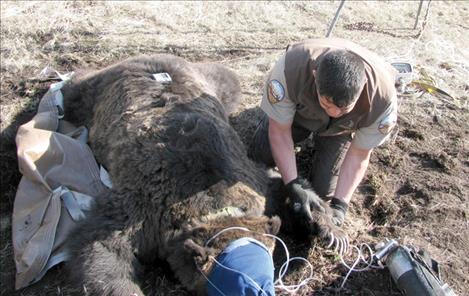Bears emerging from dens
Hey savvy news reader! Thanks for choosing local.
You are now reading
2 of 3 free articles.
News from the Confederated Salish and Kootenai Tribes’ Natural Resources Department
FLATHEAD RESERVATION — Bears are emerging from dens and moving down into the valley. During a routine radio telemetry flight on Monday tribal biologists located a radio-collared management female grizzly bear at the base of the Mission Mountains outside of her high elevation den.
Stacy Courville, Tribal Wildlife Program Bear Biologist, reminds the public that springtime on the Flathead Reservation, with its warmer temperatures and new vegetation, is accompanied by an increase in bear activity. Soon after bears emerge from their dens they search for winter killed wildlife and succulent vegetation; during spring months they are the primary sources of much-needed food for bears.
Bears are readily drawn to items like garbage, pet foods, bird feeders and other attractants like chickens and other small animals, often resulting in bear and human conflicts. Whenever someone makes food or attractants available to bears, they create situations that invite bears to become problem bears, which could ultimately endanger someone or cause the bear’s elimination.
Domestic chickens have been a particularly serious problem the past few years. Two family groups of grizzly bears have been removed from the population on the Reservation and sent to zoos. In one case, the entire family group — (a female grizzly bear and two cubs) — was taken by the zoo. In the second instance the adult female grizzly bear was euthanized and two of her three yearling cubs were taken by the zoo. Since 2010, Tribal biologists have captured 26 grizzly bears related to depredations on chickens or other small livestock. Thirteen of those bears are either dead or been placed in zoos.
In all of the incidents that Tribal Wildlife Biologists responded to it was determined that an effective electric fence would have prevented the bear conflict. Bear managers request that anyone with small livestock or chickens install an electric fence to protect and secure attractants. Defenders of Wildlife have an electric fence incentive program for just this issue (go to www.defenders.org/got-grizzlies) so there is every reason for people with small livestock to have an electric fence.
“One key aspect of the public education program is providing the public with information on ways to eliminate bear attractants,” Courville said.
To receive information on securing bear attractants and preventing conflicts, please call the Tribal Wildlife Management Program at (406) 883-2888.
Another potential for human bear conflict is recreating in bear country. Courville highly encourages people to carry bear spray. Bear spray should be readily accessible and the user should know how to use it.
One of the best ways to ensure safety is to travel in a group of three or more people and make noise. Make loud noise especially when in dense brush or near running water where surprise encounters are likely to take place. Proper use of bear spray has proven to be the best and most effective method for fending off threatening and attacking bears, and for preventing injury to the person and animal involved.
If a grizzly bear is observed, please report it to the Wildlife Management Program at (406) 883-2888. Report bear conflicts or problems to Tribal Law and Order dispatch at (406) 675-4700. When calling regarding a bear, always tell Tribal Dispatch you are calling about a bear problem or conflict.
















